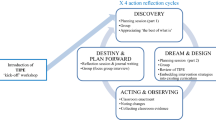Abstract
Meaning-making is vital in the realm of principalship. It serves as the fulcrum of one’s practice which eventually leads to seeing the light and appreciating the serendipity of principalship. While explicit knowledge abounds in the literature and is communicated in professional development programs, the role of the principals’ tacit knowledge derived from their experiences, day-to-day dealings with the school’s stakeholders, observations, insights, and reflections are vital inputs in understanding the dynamics of school principalship. This narrative inquiry is an attempt to capture the tacit knowledge of a Filipino secondary school principal whose experiences were limited by the absence of a formal academic preparation in school management but illumined by herleadership reflective space (LRS) which enabled her to surface the serendipitous language of principalship.
Similar content being viewed by others
References
Baker, N. N., & Hoy, W. K. (2001). Tacit knowledge of school superintendents: Its nature, meaning, and context.Journal of Educational Administration, 37(1), 86–129.
Celikten, M. (2005). A perspective on women principals in Turkey.International Journal of Leadership in Education, 8(3), 207–221.
Day, C., Harris, A., & Hadfield, M. (2001). Challenging the orthodoxy of effective school leadership.International Journal of Leadership in Education, 4(1), 39–56.
de Guzman, A. B. & Fernandez, E. A. (2005). Understanding Filipino pre-service and in-service teachers’ motivations to teach: A convergence of transcendental views.Teacher Education and Practice, 18(4), 433–441.
Dinham, S. (2005). Principal leadership for outstanding educational outcomes.Journal of Educational Administration, 43(4), 338–356.
Dimmock, C., & Walker, A. (1997). Hong Kong’s change of sovereignty: School leader perceptions of the effects on educational policy and school administration.Comparative Education, 33(2), 277–302.
Fennel, H. A. (2002). Letting go while holding on: Women principals’ lived experiences with power.Journal of Educational Administration, 40(2), 95–117.
Glasman, N. S., & Glasman, L. D. (1997). Connecting the preparation of school leaders to the practice of school leadership.Peabody Journal of Education, 72(2), 3–20.
Gurr, D., Drysdale, L., & Mulford, B. (2006). Models of successful principal leadership.School Leadership and Management, 26(4), 371–395.
Hallinger, P. (1992). Changing norms of principal leadership in the United States.Journal of Educational Administration, 30(5), 35–48.
Hausman, C. S., Crow, G. M., & Sperry, D. J. (2000). Portrait of the “ideal principal”: Context and self.NASSP Bulletin, 84(617), 5–14.
Heck, R. H. (1998). Conceptual and methodological issues in investigating principal leadership across cultures.Peabody Journal of Education, 73(2), 51–80.
Herbig, B., Bussing, A., & Ewert, T. (2001). The role of tacit knowledge in the work context of nursing.Journal of Advanced Nursing, 34(5), 687.695.
Kochan, F., Spenser, W., & Matthews, J. (2000). Gender-based perceptions of the challenges, changes, and essential skills of the principals.Journal of School Leadership, 10(4), 290–310.
Kruger, M. L. (1996). “Gender issues in school headship” quality versus power.European Journal of Education, 31(4), 447–461.
Law, L. Y. S., Walker, A., & Dimmock, C. (2003). The influence of principals’ values on their perception and management of school problems.Journal of Educational Administration, 41(5), 498–523.
Lincoln, Y. S., & Guba, E. G. (1985).Naturalistic Inquiry. Newbury Park, CA: Sage Publications.
Lyman, L. L. (2000).How do they know they care? New York: Teachers College Press.
McDaniel, R., & Pollard, L.(2003). Tacit knowledge in information systems. Professional Communication Conference, 2003.IPCC 2003 Proceedings, IEEE. DOI: 10.1109/IPCC.2003.1245521
McgOugh, D. J. (2003). Leaders as learners: An inquiry into the formation and transformation of principals’ professional perspectives.Educational Evaluation and Policy Analysis, 25(4), 449–471.
Noddings, N. (2006). Educational leaders as caring teachers.School Leadership and Management, 26(4), 339–345.
Oplatka, I. (2004). The principalship in developing countries: context, characteristics and reality.Comparative Education, 40(3), 427–447.
Pounder, D. G., & Merill, R. J. (2001). Job desirability of the high school principalship: A job choice theory perspective.Educational Administration Quarterly, 37(2), 27–57.
Portin, B. (2000). The changing urban principalship.Education and Urban Society, 32(4), 492–505.
Republic Act No. 9155.Governance of Basic Education Act of 2001. Retrieved January 24, 2007, from http:// www.lawphil.net/statutes/repacts/ra2001/ra_9155_2001. html
Schutte, T. J., & Hackmann, D. G. (2006). Licensed but not leading: Issues influencing individual’s pursuit of the secondary principlaship.Journal of School Leadership, 16(4), 438–466.
Sergiovanni, T. J. (1999). Refocusing leadership to build community.The High School Magazine, 7(1), 11–15.
Spiegelberg, H. (1965).The Phenomenological Movement. The Hague: Martinus Nijhoff.
Sternberg, R. J., Wagner, R. K., Williams, W. M., & Horvath, J. A. (1995). Testing common sense.American Psychologist, 50(11), 912–927.
Su, Z., Adams, J. P., & Mininberg, E. (2000). Profiles and preparation of urban school principals.Education and Urban Society, 32(4), 455–489.
Tomlinson, H., & Holmes, G. (2000). Assessing leadership potential: Fast track to school leadership.Journal of Educational Administration, 39(2), 104–117.
Tschannen-Moran, M., & Gareis, C. R. (2004). Principals’ sense of efficacy: Assessing a promising construct.Journal of Educational Administration, 42(5), 573–585.
Van Maanen, M. (1992).Researching Lived Experiences. London: Althouse Press.
Viernes, Sr. nR. M., & de Guzman, A. B. (2005). Filipino teachers’ experiences of supportive relationships with colleagues: A narrative-biographical inquiry.Asia-Pacific Education Review, 6(2), 135–140.
Walker, A., & Quong, T. (1998). Valuing differences: strategies for dealing with the tensions of educational leadership in a global society.Peabody Journal of Education, 73(2), 81–105.
Whitaker, K. S. (2003). Principal role changes and influence on principal recruitment and selection: An international perspective.Journal of Educational Administration, 41(1), 37–54.
Author information
Authors and Affiliations
Corresponding author
Rights and permissions
About this article
Cite this article
de Guzman, A.B., Guillermo, S.M.L.T.L. The serendipity of principalship: meaning-making of a filipino secondary school principal. Asia Pacific Educ. Rev. 8, 216–223 (2007). https://doi.org/10.1007/BF03029257
Received:
Revised:
Accepted:
Issue Date:
DOI: https://doi.org/10.1007/BF03029257




